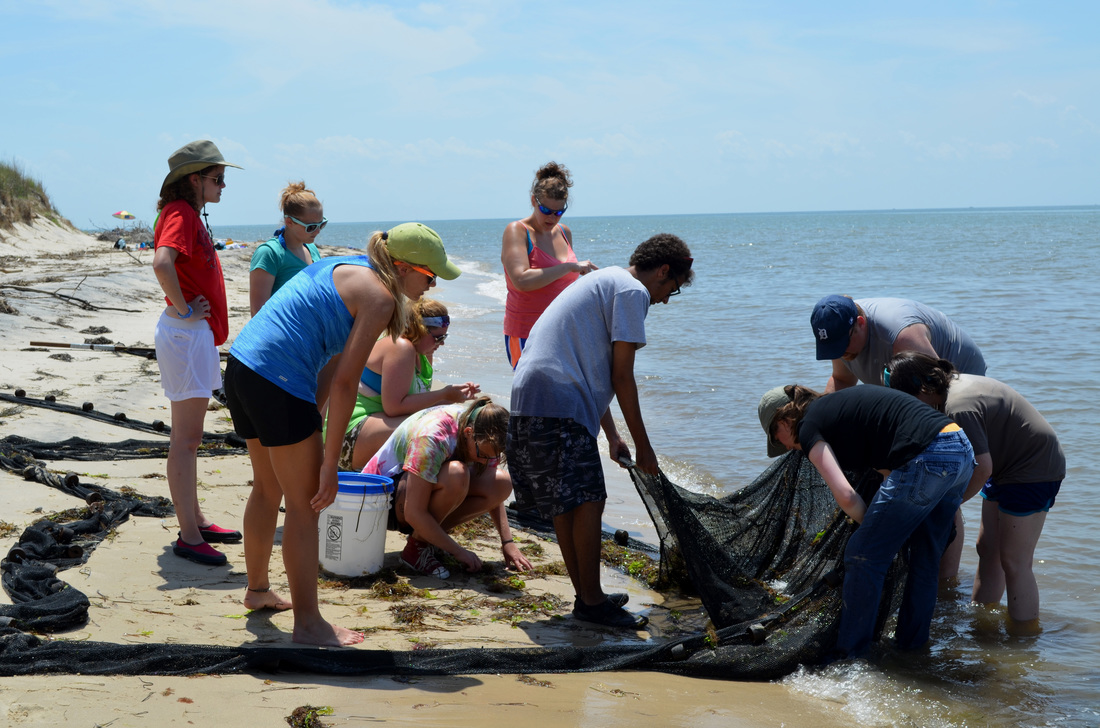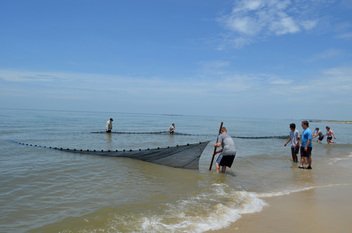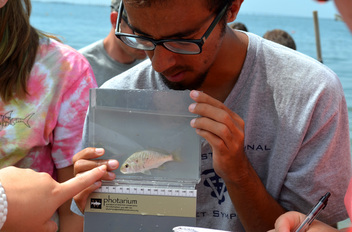|
Session II of our college summer courses is coming to a close on Friday, which means another new group of students will be moving into the Field Station in less than a week. You might think that the last week of classes would be a bit laid back, but it's just the opposite here! On Friday the Ichthyology class ventured out to Kiptopeke State Park and Savage Neck identify as many different species of fish that they could collect. Dr. Steve Seiler of Lock Haven University lead his class to Kiptopeke State Park to begin their day trip this past Friday, lasting from from 8:30 am to 5 pm. The students lathered up in bug spray and sunscreen in preparation for the heat of a full day of studying fish, and soon enough they ventured out into the waters of the Chesapeake Bay. Dr. Seiler, who has been teaching classes at the Field Station for three years, helped the students seine for fish. For both Kiptopeke and Savage Neck, the students had a goal of how many species they needed to identify, and would use the nets to catch fish until they met that goal. They used field guides to identify species that they didn’t immediately recognize, and used Photariums to take photographs of the fish and store measurements that they could record back at the lab. Then, the fish would be released. “Going to a school in Pennsylvania, as a marine science major you don’t really get the hands-on experience at school. You’re in a lab setting looking at preserved specimen,” Tabitha, a student from West Chester University, said. “Down here, you’re actually going out into the field, using sampling techniques that you can use in the real world at a real job. You’re finding specimen alive, learning to identify them, and learning about their habitats.” The students sometimes used a different process for gathering information, which involved putting the fish to sleep and measuring them on a photo board. The fish were then moved into a recovery bucket, and when they were fully awake, would be released back into the water. On this trip, this process was used on needlefish of varying sizes. After Kiptopeke, the Ichthyology vans headed to Savage Neck to go through the same process, hiking through a half mile of woods and sand dunes to get to the shore. After a successful day of sampling, everyone loaded up the van to return to the Field Station. Per tradition, Dr. Seiler treated everyone to slushies on the way home, a cool treat after a day in the sun. “I’m actually a Psychology major, but I’m taking courses down here because I’m interested in animal behavior,” said Jenny, another student from West Chester University. “What I really like about the Field Station is that it gives you a lot of hands-on experience with a lot of the field work. I would recommend that people of other majors take it to give them a more well-rounded education.” CBFS summer courses are a great way to take classes that count toward your degree and give you plenty of field experience. The Field Station summer courses are open to students from all universities, which provides opportunities to take courses that their home university doesn't necessarily offer.
“I like the hands-on work of actually working with the animals, not just seeing them up on a board and pictures, and actually realizing that when you see the organs of an animal in a book, it’s not going to look like that when you get to the animal. That’s what makes it a worthwhile experience,” Alex, a Milersville University student, said. Learn more about the summer college courses offered at CBFS here, and see a list of the Field Station's member universities. We can’t wait to welcome our next round of students in just a few days!
1 Comment
Abdeel Capote
12/5/2016 12:23:00 am
I'm interested in taking a class in Ichthyology
Reply
Leave a Reply. |
About
Everything you need to know about CBFS's educational programs, visiting Chincoteague Island, and more! Categories
All
Archives
January 2019
|
CHINCOTEAGUE BAY FIELD STATION | 34001 Mill Dam Road | Wallops Island, VA 23337 | (757) 824-5636 | [email protected]



 RSS Feed
RSS Feed

